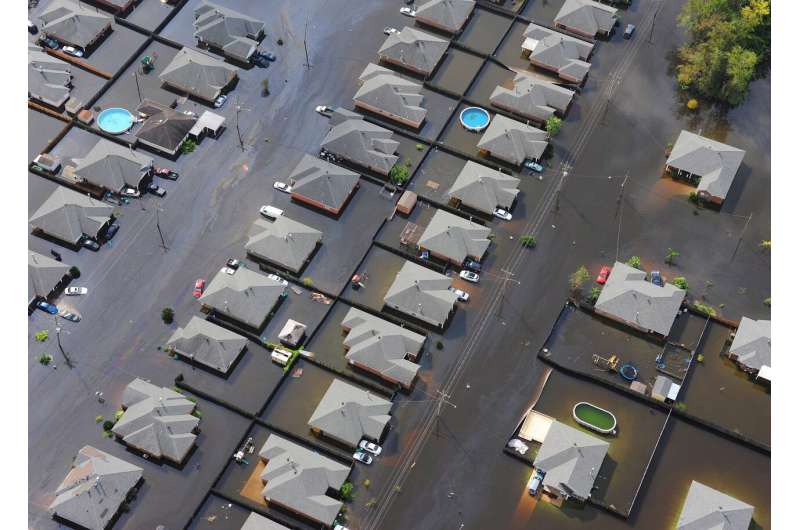This article has been reviewed according to Science X's editorial process and policies. Editors have highlighted the following attributes while ensuring the content's credibility:
fact-checked
peer-reviewed publication
trusted source
proofread
Flooded city: A slow catastrophe in post-Harvey Houston

Between 2015 and 2017, Houston was impacted by three "500-year" flood events, including Hurricane Harvey, which caused unprecedented damage to its people and its infrastructure.
In the aftermath of these catastrophic floods, researchers Dominic Boyer and Mark Vardy embarked upon an investigation of the emotional positions that emerge in populations living with climate change. Their study, "Flooded City: Affects of (Slow) Catastrophe in Post-Harvey Houston," published in Current Anthropology, identifies three such clusters of affective engagement.
Focusing on the two most heavily populated watersheds in Houston's Harris County, Brays Bayou and Greens Bayou, the scholars did fieldwork to understand the diversity of Houston's flood victims. Boyer and Vardy analyzed the affluent, majority-white neighborhood of Meyerland, and the low-income, majority-Hispanic and Black neighborhood of Greenspoint.
Their research reflected the disproportionate effect of climate disaster on economically marginalized communities of color, and revealed an overwhelming feeling of uncertainty about the future. A majority of Houston's flood victims (or "floodies," in local parlance) felt anxiety over increased rainfall and changing weather conditions, as well as a sense of distrust in institutional management of these crises. As a result, residents had begun to turn instead to their "gut decisions" to cope with their new reality; to cede "authority to affect."
One such form of affective reaction, as categorized by Boyer and Vardy, is that of "diluvial individualism." Borne out of an exhaustion with technopolitical misgovernance, diluvial individualism resonates with the concept of "negative freedom" typically associated with traditional liberal philosophy. Diluvial individualism manifests as personal assumption of responsibility even when faced with that strategy's insufficiency, and is ultimately an affective mechanism, rather than a material one.
The authors write, "[d]iluvial individualism is frequently wounded and angry; people feel that they have been forced to take on personal programs of organizational or infrastructural response because of a failure of government to discharge its duties in a fair and functional way."
This emphasis on emotion rather than effect is a quality shared by the second of Boyer and Vardy's affective responses: "hydraulic citizenship." Characterized most prominently by a citizen action group in Houston known as the Brays Bayou Association (or BBA), hydraulic citizenship, the authors write, is a "collectivized response, a practice of pressuring city authorities to put in place technopolitical infrastructures that might address the problem of flooding through social gatherings and bureaucratic spaces."
Hydraulic citizenship, furthermore, acts largely in the interest of preserving a vanishing image of a pre-climate change status quo.
The third and final affective strategy proposed in "Flooded City" is that of "amphibious acceptance." This orientation seeks to live with the effects of flooding and other climate change, rather than denying or resenting them, and takes the form of initiatives like the consolidation of housing in dense, high-elevation areas, and the conversion of the coastline back to green space ecotones in which the bayou and the residents of Texas can coexist.
Although amphibious acceptance has not yet attained the presence in Houston that these other affective modes have, it offers a powerful opportunity for the future of Houston, and even, in the face of slow catastrophe, a radical sense of hope. The authors conclude, "We are eager to see how an amphibious Houston might take shape, a Houston that can learn to thrive in its muck, to live with its rising waters, a city that might still steal a future from the jaws of its toxic history."
More information: Dominic Boyer et al, Flooded City, Current Anthropology (2022). DOI: 10.1086/722270
Journal information: Current Anthropology
Provided by University of Chicago



















